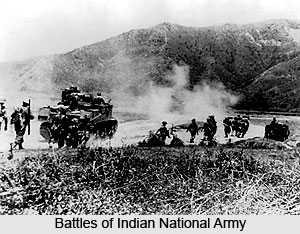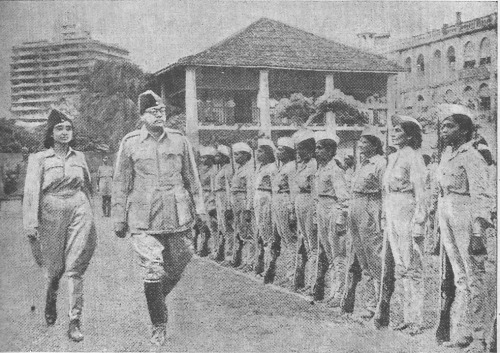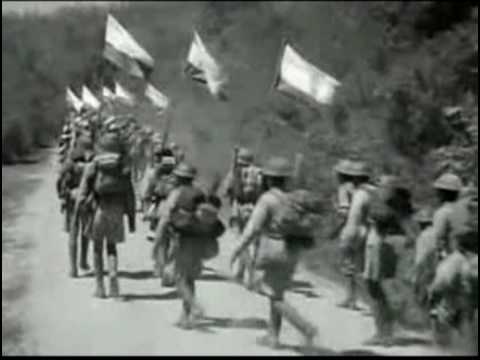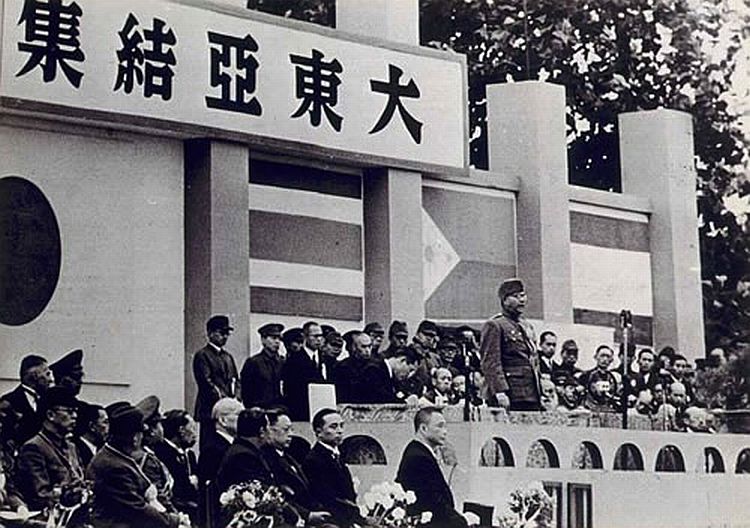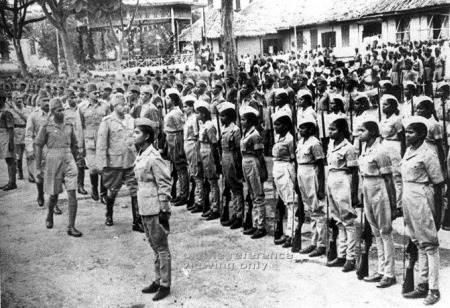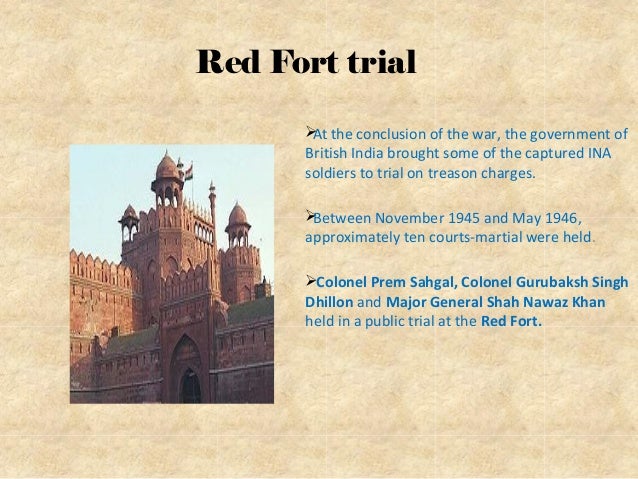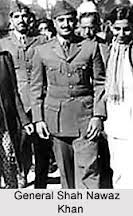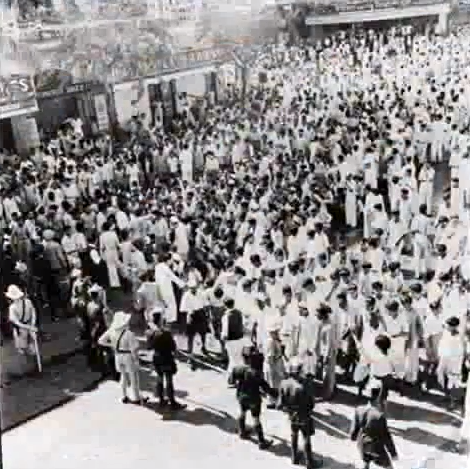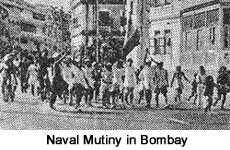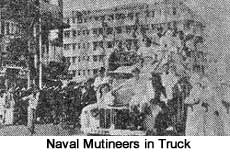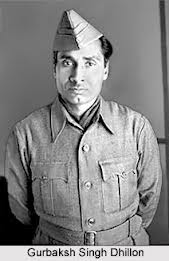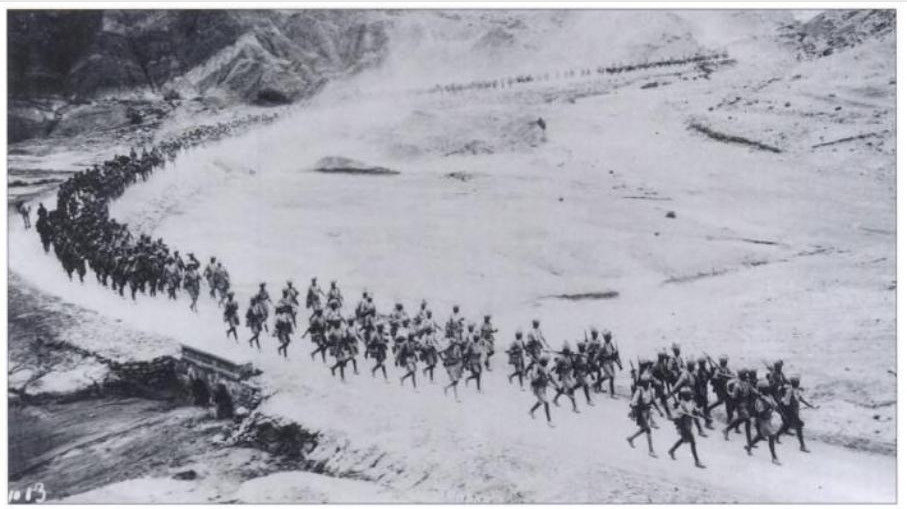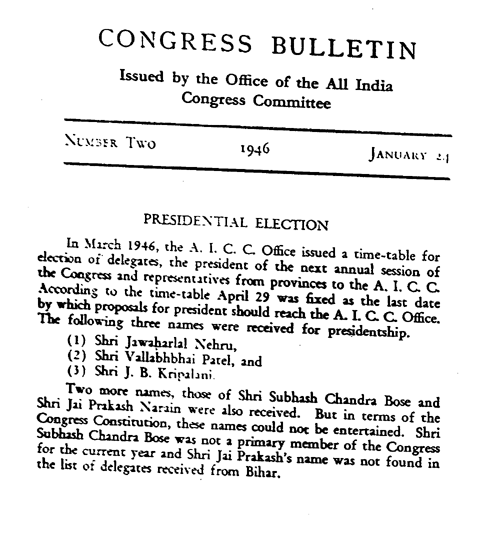Role of Subhash Chandra Bose and the Indian National Army
by : S. Priyadarshini
While the whole nation was engaged in the August movement, the struggle for independence was carried on by Subhash Chandra Bose outside the frontiers of India. Indians were fighting tooth and nail to liberate their motherland from outside. The Indian National Army and Subhash Chandra Bose were playing their significant role in the freedom struggle of India. Subhash Chandra was one of the foremost among the nationalist leaders of India, brave and youthful he possessed excellent organising capacity.
Born on 23rd January, 1897 at Cuttack town to a pleader father Subhash Chandra was selected into the Indian Civil Service after a brilliant academic career. In the service when he was called upon to take an oath of allegiance to the crown, he refused to do so and left the job in 1921. During his college career he had shown what he was going to be when he beat an English man black and blue for his having criticised the culture of India.
After leaving the service Subhash joined the non-cooperation Movement but was not satisfied with the principle of non-violence of Gandhiji and supported Motilal and C.R. Das in the venture of organising the Swarajist party. Subhash was appointed the Chief Executive officer of Calcutta by C.R. Das, the Mayore of Calcutta. The progressive activities of Subhash invited the displeasure of the Government and were deported to Mandalay.
Subhash represented the young and extremist elements in the Congress. He was elected as the President of the Congress in 1938 and again in 1939. He could not make any compromise with Gandhi and thus resigned his President-ship and organized the famous Forward Block. During Second World War he was put under house arrest in his ancestral house in Elgin Road; Calcutta but escaped and reached Japan.
In a romantic and daring journey changing names and looking different he proceeded from there to Moscow and finally reached Berlin in March 1941. The German dictator Adolf Hitler did not like to help him for the cause of Indian independence.
In Germany the Indian community hailed him as Netaji and greeted him with the slogan “Jai Hind”. From Berlin Radio he regularly broadcasted to India urging his countrymen to rise against the British. He very soon felt that South-East Asia would be a suitable ground for his grand scheme of raising a national army to free India from the British yoke. The golden opportunity for him came when Japan joined the war.
At that time Rash Behari Bose was busy in organizing a notable organization in the name of Indian Independence League in Japan to help the end of British rule in India. Rash Behari Bose convened two conferences one at Tokyo in March, 1942 and the second in Bangkok in Jun 1942. The revolutionaries assembled in the conferences decided to form an Indian National Army (Azad Hind Fauz) for the liberation of India from the British rule.
The army was to be formed with Indians in the South-East Asian Countries and Indian soldiers of the British Army captured by the Japanese. Capt. Mohan Singh was primarily responsible for raising the army. Rash Behari Bose was made the President of the Council of Action. Shortly afterwards Rash Behari dismissed Mohan Singh whose personal ambition endangered the I.N.A. Rash Behari then played a pivotal role in organizing the movement. Subhash Bose was invited to take up the leadership.
In February 1943, Subhash left Germany from Kiel port in a Submarine. Through risk, suffering and untold hardship he finally reached Tokyo in June 1943. He held discussion with the Japanese authorities in the course of which the latter promised the independence of India after the war. From Tokyo he went to Singapore where he was warmly welcomed by Rash Behari and the latter handed over the leadership to Subhash.
Subhash became the President of the Indian National Army as well as the President of Indian Independence League. Addressing a huge meeting at Singapore on 4th July, 1943 Rash Behari said “In your presence to-day I resign my office and appoint Desh Sevak Subhash Chandra Bose as President of the Indian Independence League.”
However Rash Behari remained a courageous and selfless freedom fighter till his death on 21st January 1945. It was Rash Behari who prepared the stage in the East and South-East Asia for Subhash Chandra Bose to play on his significant role which India observed. Paying tribute to Rash Behari on the day of his death Subhash described him as the father of the Indian Independence Movement.
Gradually the number of the I.N.A. men began to grow greatly. Assuming the command of the I.N.A. he gave his famous battle cry “Delhi Chalo” (on to Delhi). He worked out a master plan of campaign for the INA with the ultimate goal of reaching Delhi. A provisional Government of Azad Hind (Free India) was set up.
Its object was “to launch and to conduct the struggle that will bring about the expulsion of the British and of other allies from the soil of India.” Addressing the army he said “We have a grim fight ahead us for the enemy is powerful, unscrupulous and ruthless. In this final march to freedom you will have to face hunger, privation, forced marches and death. Only when you pass this test will freedom be yours.”
The INA revealed Subhash Bose’s greatness as a military leader and an organizer too. One of the INA Brigades advanced with the Japanese army upto the frontiers of India. The Indian national flag was hoisted in Kohima in March 1944. But with the change of fortune in the war and the retreat and defeat of the Japanese the INA collapsed. The role of INA had far reaching influences on the Indian political scene.
When the stories of their remarkable courage and sacrifice came to the knowledge of the Indian people at the end of the war, the nation came under a wave of revolutionary upsurge. The British Government could realise that patriotism for Indians was greater than their service to a foreign power. Subhash was the greatest enemy of the Viceroy Lord Wavell.
The communists described him as an agent of the “Facist Powers”. Gandhiji admired the courage and resourcefulness displayed by Subhash in making his escape from India. Inspite of his principle of violence Subhash Chandra Bose’s grand scheme of India’s liberation and the high idealism through INA movement inspired the people of India in an unprecedented manner.
The organisation of the Azad Hind forces and their exploits are a milestone in the history of the Indian struggle for freedom; the formation of which was the brain child of Subhash Chandra Bose.
INA Trial:
In the midst of conflict between the Congress and the League the Government instituted a public trial of the Azad Hind Fouz soldiers on charges of treason. The trial only helped to rouse the people’s patriotic emotion. The exploits of INA led by Netaji stirred the whole nation and the country was thrilled with excitement. The congress engaged a set of lawyers including. Jawaharlal Nehru, Tej Bahadur Sapru and Bhulabhai Desai to defend the leaders on trial.
The INA leaders in the first instance were convicted but their sentences were soon remitted and ultimately they were set free. However some INA officers were not released for which there was a public resentment. Demonstrations were organized in different parts of the country. Sarat Chandra Bose, the brother of Subhash Chandra mobilized the public sentiment in support of the INA and made elaborate arrangements for the celebration of the anniversary of the foundation of the Azad Hind Government on 21st October, 1943.
The trial of the INA officers in the historic Red Fort became a “tribute to the martial courage of Indians, a symbol of her sense of total independence, a matter more of pride than of justice.”
In February, 1946 a serious mutiny broke out in the Royal Indian Navy at Bombay. British troops were called in to crush the rebellious navy men as the Indian soldiers refused to open fire at their brethren. The British Commander-in-Chief General Archinleck warned the army. Nehru declared “Our armed forces have every right to revolt against the foreign ruler in order to achieve the freedom of our country.”
The Government had no other way out than to think over the matter of releasing Colonel Shah Nawaz, Major G.S. Dhillon and Captain Prem Sehgal along with other trials who were the heroes of the hour. By the release of these trials the people could believe that it-was a great victory for Indians. Gradually the situation in the Indian Army tended to take a serious turn before it ended a few days later owing to the efforts of Sardar Patel.
The mutiny in the Royal Indian Navy made it clear that the British Indian Empire could no longer depend on the Indian staff. The realization virtually precipitated the process leading to the transfer of power. The entire history of the Indian National Army was thus the outcome of the matser brain and the heroic activities of Subhash Chandra Bose supported by Rash Behari Bose.
The Freedom Movement: Bose’s contribution ignored
Historically speaking, the most important fact to emerge from a restudy of the Indian Freedom Movement is the following: it was Subhas Bose, rather than Gandhi or his associates, who contributed the most to India’s freedom in 1947. This represents a radical change of perspective but rests on unimpeachable authority. In the Introduction, I had noted that in the second edition of his Voume III, Majumdar produced startling new evidence that confirmed his earlier claim that Subhas Bose’s contribution to Indian independence in 1947 was probably greater than Gandhi’s. We shall be looking at Bose’s leadership of the INA and its campaigns later in the article, but first a look at the evidence Mujumdar referred to. It comes from no less a person than Clement Attlee, the Prime Minister who took the decision to grant independence to India. Since this is of fundamental importance, it is worth placing it on record. The full details can be found in Majumdar, Volume III pages 609 -10.
When B.P. Chakravarti was acting as Governor of West Bengal, Lord Attlee visited India and stayed as his guest for three days at the Raj Bhavan. Chakravarti asked Attlee about the real grounds for granting independence to India. Specifically, his question was, when the Quit India movement lay in ruins years before 1947 where was the need for the British to leave in such a hurry. Attlee’s response is most illuminating and important for history. Here is the Governor’s account of what Attlee told him:
In reply Attlee cited several reasons, the most important were the activities of Netaji Subhas Chandra Bose which weakened the very foundation of the attachment of the Indian land and naval forces to the British Government. Towards the end, I asked Lord Attlee about the extent to which the British decision to quit India was influenced by Gandhi’s activities. On hearing this question Attlee’s lips widened in a smile of disdain and he uttered, slowly, putting emphasis on each single letter – “mi-ni-mal.” (Emphasis added.)
Chakravarti later mentioned this conversation with Attlee in a speech broadcast on All India Radio, but left out all references to Gandhi. (He should not have.) Majumdar had reached the same conclusion years earlier, as far back as 1948. This writer (Rajaram) can support the conclusion on the basis of discussions with men and officers of the Indian armed forces of the period – including his own relatives. In any event, we have Attlee’s own authoritative words.
The crucial point to note is that thanks to Subhas Bose’s activities, the Indian Armed Forces began to see themselves as defenders of India rather than of the British Empire. This, more than anything else, was what led to India’s freedom. This is also the reason why the British Empire disappeared from the face of the earth within an astonishingly short space of twenty years. Indian soldiers, who were the main prop of the Empire, were no longer willing to fight to hold it together.
This also accounts for the outwardly puzzling fact that the Congress Party, dominated by the Nehru-Gandhi dynasty, has tried to turn Subhas Bose into a persona non grata. He poses a serious threat to the political dominance of the dynasty, and could even jeopardize it, taking with it the power and privileges that have accrued to its beneficiaries. Thanks to the Congress domination of Indian institutions for over forty years, history books have been written to serve its interests. This is one of the significant conclusions to follow from a reexamination of recent Indian history.
Road to freedom: Subhas Bose and the INA
Following his breach with Gandhi, Bose launched his own non-cooperation movement. At that time he was probably the most influential political leader in India, especially with the youth of the country. The rest of his short career reads like a thrilling romance. If his career and achievements outside India, leading eventually to the rise of the spirit of nationalism in the armed forces had been widely disseminated, he would undoubtedly have been celebrated as a great popular hero. Nehru, with his interminable pedantic speeches, would have suffered greatly in comparison. This no doubt is one of the reasons why successive Congress Governments went to such lengths to turn Subhas Bose into a persona non grata.
Several volumes have been written on the INA, so what follows is a very brief summary of Subhas Bose’s activities during the War. As noted earlier, Bose on his own initiative launched a campaign of disobedience for which he was arrested in July 1940. He was shortly released from prison due to ill health, but kept under house arrest. Bose somehow managed to escape from detention in the early hours of January 17, 1941. Traveling incognito, he went by train to Peshawar near the Afghan border. Then under the nose of the British border patrol, he crossed the Indian border by foot at Jamru and reached Garhi in Afghanistan. Boarding a car waiting for him, he made his way to Kabul where plans had been made for him to travel to Moscow with an Italian passport. And on March 28, 1941, he flew to Berlin where he was received by the German Foreign Minister Joachim von Ribbentrop. This shows that foreign governments regarded Bose as a leader of the highest importance.
Bose proposed that he would raise ‘Free India’ units from Indian prisoners of war in Germany, in exchange for a Declaration of Indian Independence by the Axis powers. Since Germany was at the time still allied with Russia, and India was thought to fall in the Russian sphere of influence, Germany was not prepared to declare India independent. (This is Mujumdar’s surmise which appears reasonable.) But Bose was allowed to speak to the prisoners and raise Free India units. His plan was to turn them from British Indian soldiers into Indian National soldiers. He felt that this would eventually turn a substantial part of the Indian army to the national cause. He was confident of German victory and felt that as his Free India units marched against the British, Indian soldiers of the British would join him. His plan received a fillip when Germany declared war against Russia. There were no longer any restraints on his activities.
When he went to speak to the Indian prisoners, at first he met with considerable hostility, and his speech was interrupted. Apparently the British indoctrination was too strong and too thorough to be so easily overcome. Bose then changed his tactics. He met with the men individually and in small groups and gradually won them over. Recruits began to pour in for his Indian Legion, and by January 1942, he had formed two infantry units. Bose founded Free India Centers in Rome and Paris also, and the Indian Legion soon reached its planned strength of 3000. But then Japan’s entry into the War and their phenomenal success against the British in Southeast Asia made Bose change his plans.
Japanese successes against the British in Southeast Asia have few parallels in the annals of war. Singapore fell on February 15, 1942 and Rangoon on March 7. While the Israeli victory in the Six Day War, and the Indian victory in the Bangladesh War are comparable in speed of success, they were achieved in smaller theatres. Bose immediately saw that Southeast Asia, because of its proximity to India and its substantial Indian population, offered a much better base for his operations than Europe. In addition, the sensational collapse of British power in Asia had made a great impact on the Indians living in the region, raising their nationalistic feelings. They saw that freedom was within grasp.
The leader of what may be called the Indian National Movement in Southeast Asia was Rash Bihari Bose. With a Japanese wife, he had settled in Japan as a citizen of that country. Through largely his efforts, several Free India Centers were established throughout Southeast Asia to further the cause of Indian independence. Thanks to his initiative, a conference was held in Tokyo on 28-30 March 1942. At this conference, a resolution was passed to form an Indian National Army (INA) under the direct command of Indian officers to conduct a campaign for the liberation of India. This was followed by a conference at Bangkok in June, attended by more than a hundred delegates from Burma, Malaya, the Andamans and Nicobar and other countries of the region. Rash Bihari Bose was elected Chairman.
Rash Bihari Bose raised the tricolor flag of independent India, and the Indian Independent League with the attainment of independence as its goal, was formally inaugurated. It was decided also to invite Subhas Bose to takeover the leadership.
The formation of the Indian National Army was the work of Captain Mohan Singh of the 14th Punjab Regiment, a prisoner of war. He was one of the 40,000 Indian prisoners handed over to the Japanese by the British Colonel Hunt after the fall of Singapore. (Only the Indian units at Singapore had offered any resistance, the British were busy leaving.) Mohan Singh managed to escape from prison, but then approached the Japanese with an offer to raise units for an Indian National Army (INA) that would join the Japanese in the fight against the British. The goal was to drive the British out of India. Many Indian prisoners of war joined the INA, but many others – especially the officers – did not. By the end of August 1942, forty thousand prisoners of war had signed a pledge to join the INA. This should give an idea of the magnitude of the British defeat in Southeast Asia.
Much anti-propaganda has been directed against the INA, implying that its recruits were mercenary cowards who joined it only to escape from prison. But their fighting record does not support this view. The following resolution passed during the formation of the INA shows them to be true patriots (Volume III, p 583):
… an Indian National Army be formed comprising the Indian troops and civilians in East Asia. Captain Mohan Singh would be the Commander-in-Chief of this Army of Liberation of India. The Indian Independence League [with Rash Bihari Bose as President] would make arrangements for the supply of men, material and money required by the Indian National Army, and would request the Japanese Government to supply the necessary arms and equipment, ships and aeroplanes required by the Indian National Army which would be commanded entirely by Indian Officers and would fight only for the liberation of India. (My emphasis.)
This shows that Indian civilians from the region also joined the INA and otherwise supported it. Many businessmen and traders made generous donations to the cause. In addition, it is hardly credible that a person of Subhas Bose’s proven patriotism and record of sacrifice would have been associated with a mere mercenary outfit. It should be noted however, that the INA had much less success in recruiting officers than soldiers. This shows that the Indian officers, because of their closer association with their British counterparts, had become more ‘Anglicized’, and chose not to have anything to do with the fellow Asians of the region.
As noted, Subhas Bose was invited to join and take over the leadership of the campaign. This presented formidable difficulties. It took eight months before the Germans were prepared to let Bose go because of the dangers of a long sea voyage in hostile waters. Finally, after a long and hazardous submarine voyage, first in a German U-boat, and then a Japanese submarine, Bose and his companion Abid Hassan landed in Sumatra (in Indonesia) on 28 April 1943. He was met by a Japanese delegation and arrived at Tokyo on 13 June 1943. The very next day he was received by the Japanese premier Tojo and later also by the Emperor.
Tojo told Subhas Bose that British defeat in the war was certain, but Japan had no demands to make on India beyond the necessities of war, and was prepared to see India independent. He also encouraged Subhas Bose in his plan to form a Provisional Government, which would take control of the territory from which the British were evicted.
Subhas Bose arrived in Singapore on 2 July 1943, and took over the leadership of the Indian Independence League from Rash Bihari Bose on July 4. He made public his decision to form a Provisional Government of Free India and to lead the Indian National Army towards India. The next day, the formation of the INA was announced to the world, and on August 25, Subhas Bose assumed formal command of the INA. His call was chalo Delhi – March to Delhi. At last, the INA and the Indian Independence League had found a leader of stature to match their lofty goals.
The Provisional Government of Free India was announced at an emotional public meeting held at Singapore on 21 October 1943. The proclamation declared (Volume III, p 588):
It will be the task of the Provisional Government to launch and to conduct the struggle that will bring about the expulsion of the British and their allies from the soil of India. It will then be the task of the Provisional Government to bring about the establishment of a permanent National Government of Azad Hind [Free India] constituted in accordance with the will of the Indian people and enjoying their confidence.
It should be noted that at all times Subhas Bose was conscious of the fact that the INA must preserve its identity as a national army, and not become a tool of the Japanese. This in fact was the basis of his appeal to Indian prisoners of war. When Field Marshal Terauchi, Commander-in-Chief of the Japanese forces in Southeast Asia, suggested to Bose that the Japanese would do all the fighting necessary to liberate India while he should only assist in enlisting the support and goodwill of the Indian people, Bose was shocked. Bose told him, “Any liberation of India secured through Japanese sacrifices would be worse than slavery.” Indians must make the maximum sacrifice in blood and effort to free their homeland. The INA units therefore must be the vanguard of any campaign to liberate India.
Terauchi conceded Bose’s point, but as a military man, he wanted a demonstration of competence in the field by the INA soldiers. It was a common belief among the Japanese that Indian troops were only British mercenaries. In view of the dismal performance of the British under the Japanese assault, they had no great opinion of Indian soldiers. Terauchi’s demand was probably no more than what any military officer in his place would have asked. But Bose would not yield, and Terauchi suggested a compromise. He proposed that an INA regiment be deployed as a test case, and if this regiment “came up to the Japanese standard” he said, “the rest of the army would be sent into action.”
Terauchi had no reason to regret his decision. The INA came through with flying colors. Moved by the brilliant performance of the INA soldiers in the field, the Japanese Commander-in-Chief in Burma went to Subhas Bose, and bowing before him said: “Your Excellency, we were wrong. We misjudged the soldiers of the INA. We know that they are no mercenaries, but real patriots.” (Volume III, p 597)
Much nonsense has been written about the INA as a fighting force and about Subhas Bose as a commander. Judged by any standards, Bose’s success in building up from scratch an army that could fight on equal terms and at times even best the highly trained and superbly equipped British Indian Army, was a fantastic achievement. And this eventually led to India becoming free. It demonstrated leadership qualities and organizational abilities of the highest order. Compared to Bose’s (and INA’s) contribution to history and record of leadership, the various sporadic movements organized by Gandhi and his followers seem puerile. And yet there is no shortage of Congressmen – including Nehru of Pancha Sheela fame – who accuse him of being an impractical dreamer! In modern Indian history, only Sardar Patel’s integration of the Indian states is an achievement that stands on the same level.
As a fighting force, the INA was a remarkable machine considering the enormous handicaps of experience, equipment and training under which it had to work. When it began, it had no officer who had commanded even a battalion, and yet within two years it was called upon to fight the British Army of corps strength or more. Whenever it had to face local engagements, the INA units were often more than a match for the British units. This was recognized by the Japanese commanders when they proceeded to place Japanese troops under the direct command of Captain Suraj Mal of the INA. It was probably the first time in the history of the Japanese Army that its men had been placed under the command of a foreign officer. To call the men and officers of the INA ‘traitors’ would be like calling George Washington and other American freedom fighters traitors, simply because they too had fought on the British side during the French and Indian Wars, and yet took French help in their fight for freedom.
In the field, men and officers of the INA displayed uncommon gallantry under incredibly harsh conditions. The following account of the capture of the height known as Mythun Khunou gives an idea (Volume III, p 600):
A whole British brigade, 3000 strong, supported by heavy artillery and aeroplanes led an attack against 600 INA men. The situation became extremely grave as all the commanding heights and strategic points were in the hands of the British. The commander of the INA brigade issued orders to capture the heights at any cost. Lt. Mansukh Lall, commanding a platoon of 30 men, showed unparalleled heroism in capturing one of these heights. “While leading his small and semi-starved force up the ridge, he was wounded 13 times; through exhaustion and loss of blood, he staggered and fell to the ground.” His men wavered, but “making a last supreme effort, with 13 bullet wounds in his body, he rose to his feet and personally led the final assault on the height …” The British forces retreated leaving the height in possession of the INA.
This episode was by no means exceptional. When it entered India, what stopped the INA at the tactical level was the torrential Indian monsoon rather than the British Army; at the strategic level, what forced its retreat was the general collapse of the Japanese position in the East. Shahnawaz Khan of the INA, who saw a great deal of action as commander of the Subhas Brigade (named after Subhas Bose in spite of his vigorous protests), wrote (Volume III, p 603):
Thus ended the main INA and Japanese offensive which had been started in March, 1944. During this period, the INA, with much inferior equipment and extremely poor supply system, was able to advance as much as 150 miles into Indian territory. While the INA was on the offensive, there was not a single occasion on which our forces were defeated on the battlefield, and there was never an occasion when the enemy, despite their overwhelming superiority in men and material, was able to capture any post held by the INA. On the other hand, there were very few cases where the INA attacked British posts and failed to capture them. In these operations the INA lost nearly 4000 men as killed alone.
The war in the East, including the performance of the INA, shattered the carefully nurtured myth that Indian soldiers fought well only when led by British officers. The ignominious defeat of the British at Singapore and elsewhere in the East was a blow from which British prestige never recovered. They could no longer pretend that only they could lead troops or that Asiatics could not fight without European officers. This was not an easy thing for the British to stomach. In the face of this it is hardly surprising that British writers should have tried to make light of the INA as a fighting force and of Subhas Bose as a leader.
It is unnecessary to go into details of the INA campaigns, for its significance was less military than national. At last India had a national army commanded by a leader of the first rank that posed a serious threat to the British hold over India. This was something that the other Congress leaders, steeped in pacifism and bereft of a national vision, had failed to provide in twenty-five years. All they had to offer were a series of sporadic movements that crumbled as soon as they met resistance, or due to the whimsical decisions of a leader trying to be a holy man.
Subhas Bose did not live to see the country free. He died in an air crash under somewhat mystifying conditions. He left Saigon in a Japanese bomber and arrived at Taihoku in Farmosa (Taiwan) on August 18, 1945. He left in another plane for an unknown destination, after which there is a complete blank. The official Japanese version is that his plane crashed almost immediately after takeoff, but there are many gaps in the account.
Japan surrendered on September 15, 1945, formally ending the war. After the war, the British Indian Government put on trial three men of the INA – a Hindu, a Muslim and a Sikh – for desertion and treason. This historic trial, held at the historic Red Fort at Delhi was a national sensation. The country, including many in the armed forces, regarded these men as patriots rather than traitors. The British saw the writing on the wall: Indians would no longer fight for the British. The British Indian Army was now for all practical purposes the Indian National Army. This was Subhas Bose’s great achievement. The British saw that the sooner they left the better for themselves, for, at the end of the war, India had some three million men under arms.
This is what forced the British out of India – a fact admitted by no less a person than Prime Minister Attlee. Subhas Bose’s campaign to free India had finally borne fruit, though he was no longer on the scene to witness it.
It is an irony of history that the British prevailed in the war against Japan because of the Indian Army; we have this on the word of Field Marshall Slim, Commander-in-Chief in the East. India too gained independence only because of the Indian soldiers. So both British victory in the East – Pyrrhic though it proved to be – and Indian independence were due to the Indian Army. But the latter needed a leader of indomitable courage and will to lead it in the national cause. It was fortunate for India that such a man appeared on the scene in the person of Subhas Bose. Nehru, Gandhi and others were part of a side show.






